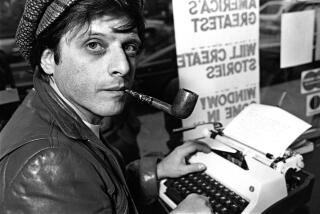Audio Books : A Master’s Last Work Disappoints
- Share via
Ralph Waldo Ellison, one of the premier black writers in this country, wrote only one completed novel before his death in 1994. His projected second novel, which he began writing a few years after publication of “The Invisible Man,” took on a mythology of its own. He worked on it for almost three decades, at one point losing hundreds of original pages of manuscript in a fire, and never did complete it. After his death, Ellison’s widow gathered about 2,000 scattered pages and handed them over to Ellison’s literary executor, John F. Callahan, for editing. The result is a tale of the irony of religion and race.
Unfortunately, the Callahan-titled “Juneteenth” is a multi-toned novel with so many focal points that it does not translate well to audio. (Random House AudioBooks; abridged fiction; four cassettes; six hours; $25.95; read by Blair Underwood.)
The story revolves around two charismatic men. There is Sen. Adam Sunraider, a white, race-baiting politician who takes a bullet on the Senate floor. And there is Alonzo “Daddy” Hickman, a black Baptist preacher who raised the young Sunraider, then known as “Bliss,” to be a roof-rattling preacher.
Lying on his deathbed after the shooting, Sunraider journeys with Hickman into their complicated past. When Ellison writes of religion and race and the rhythm of jazz, “Juneteenth” is electrifying. But when the two men remain confined in a hospital room, the work is static. Also, the absence of explanation as to Sunraider’s transformation from preacher to politician is baffling and confounding. Most important, this story takes place in two voices and at various times.
These chronological and narrative shifts are clarified in the printed text through italics and spaces placed between passages. A lengthy section of notes provides useful explanation. Since much of the novel is missing on audio, along with the notes and a well-written introduction by Callahan, the listener is left fairly clueless.
It is an enormous shame that Random House did not release “Juneteenth” in its entirety for the audio version. The novel is not of seminal importance in the manner of “The Invisible Man,” but it does contain elegant and powerful prose. The company chose one of the most skilled narrators in the business, then handed him but half the material to read.
A vivacious performer, Underwood reels off a roster of varied voices. The senator and the preacher have distinctly different vocal patterns and pitches. Underwood sings, he delivers the commanding speeches of a revivalist preacher and creates the high, angry wails of an elderly woman. If he is weak in an area, it is that he overdoes the female voices a bit. That is not much of a problem, however, due to the heightened emotion of the text.
If you really want to discover Ellison’s first-rate talent, pop “The Invisible Man” into your cassette player. (Random House AudioBooks; unabridged fiction; 11 cassettes; 18 hours and 30 minutes; $39.95; read by Joe Morton.)
This fascinating study of racism was first published in 1952. It tells the story of a nameless black man as he travels from the Deep South to Harlem. Along the way, he matriculates and is then expelled from a Negro college. He moves North, becomes a representative for “The Brotherhood” and, after tasting violence, disappears into his basement retreat, where he imagines himself invisible.
Both subtle and shocking, this classic novel limns racism in all its many forms. It builds upon the crushing loss of individuality and identity in a society that places value upon conformity and skin tone. The novel’s great emotional range, from desperate fear to subtle subjugation, is captured by Morton. His voice is not as rich nor his range as wide as Underwood’s, but he does a superb job delivering the novel’s tone. The actor raises his voice for a minister’s inspirational speeches and alters his delivery for various characters. One problem with both productions is that the volume is not properly controlled. However, the publisher did use appropriately atmospheric music to begin and end each rendition, giving each a measure of polish.
Rochelle O’Gorman reviews audio books every other week. Next week: Dick Lochte on mystery books.
For more reviews, read Book Review
* Sunday: Richard Sennett examines the joys of work; Jonathan Levi reviews Ivan Klima’s new book of stories; Christopher Hitchens discusses why George Orwell matters; and Nick Salvatore asks, “Does anyone still remember Eugene V. Debs?”
More to Read
Sign up for our Book Club newsletter
Get the latest news, events and more from the Los Angeles Times Book Club, and help us get L.A. reading and talking.
You may occasionally receive promotional content from the Los Angeles Times.









